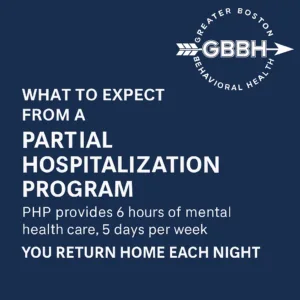When everything feels new and uncertain, choosing the right care can feel like its own diagnosis.
Maybe your therapist or provider recently suggested a PHP. Maybe you’re still figuring out what that even means. Maybe you typed “PHP near me” into Google at 2 a.m. because something in you whispered, “You might need more than this.”
If you’ve recently been diagnosed with a mental health condition, you’re not just navigating symptoms. You’re navigating language, systems, fears, and questions you didn’t even know how to ask before. At Greater Boston Behavioral Health, our partial hospitalization program in Boston is designed for this exact moment—when you’re vulnerable, uncertain, and still figuring out how to feel hopeful again.
What Is a PHP—and Why Might It Help?
A partial hospitalization program (PHP) is a short-term, intensive mental health treatment option that provides daily therapeutic support—without requiring overnight stays. It’s often recommended for people who need more help than weekly therapy can offer but don’t require the full structure of inpatient hospitalization.
For many, PHP becomes a bridge. Not just between crisis and recovery—but between diagnosis and understanding. It’s the place where treatment becomes more than a word on a referral sheet. It becomes people. It becomes rhythm. It becomes healing that happens in real time.
You’ll spend most of the day in treatment—typically five days a week, about six hours per day—and return home each evening. It’s immersive care without disconnection from your everyday life.
You Don’t Have to “Be Worse” to Deserve Structured Care
Here’s a truth that might feel hard to believe: you don’t have to hit rock bottom to receive intensive support. You don’t have to “earn” care by being in crisis. You don’t have to prove that things are bad enough.
It’s common for people new to a diagnosis to wonder if they really belong in a PHP. Maybe you’re still going to work. Maybe no one else knows you’re struggling. Maybe part of you is still hoping this is just a rough patch that will pass.
But struggling quietly is still struggling. High-functioning does not mean healthy. And if the care you’ve been receiving hasn’t felt like enough, that’s reason enough to consider something more supportive.
A Day in the Life of a PHP Client
So what actually happens during a day in PHP?
While each program is tailored to its clients, at Greater Boston Behavioral Health, a typical PHP day includes:
- Morning check-in: A grounding ritual that sets the tone, helps staff monitor symptoms, and builds a safe routine.
- Group therapy: Facilitated by a licensed clinician, these groups offer a chance to explore emotions, practice communication, and learn from others navigating similar experiences.
- Skill-building sessions: These often include evidence-based therapies like CBT (Cognitive Behavioral Therapy), DBT (Dialectical Behavior Therapy), mindfulness training, or distress tolerance strategies.
- Individual therapy: You’ll meet regularly with a dedicated therapist who tracks your progress, explores deeper issues, and adjusts treatment goals.
- Psychiatric care (as needed): Medication support and evaluation can be included, with a psychiatrist helping manage any medication concerns or new prescriptions.
- Lunch and breaks: Time to decompress, eat, and rest is built into each day to prevent overwhelm and encourage integration of what you’re learning.
Each piece is designed to work together—like scaffolding—so you’re not holding yourself up alone.
Why Local Matters When Choosing a PHP
When you’re living with anxiety, depression, bipolar disorder, or any new mental health diagnosis, just getting out the door can be a victory. That’s why choosing a nearby PHP matters. It reduces the logistical friction of showing up—and showing up is often half the battle.
Whether you’re looking for a PHP near me, partial hospitalization program in Dedham, MA or Needham or Newton, staying local gives you access to treatment while maintaining important pieces of your life—your home, your routine, your autonomy.
Local care also makes transitions easier. If you eventually move to an intensive outpatient program (IOP) or individual therapy, you’re already connected to a regional system of providers and referrals.
It’s Okay to Be Afraid of Diagnosis, Medication, or Change
Being newly diagnosed isn’t just about learning what a condition means. It’s about wondering what it means for you. Will this change who I am? Will I be on medication forever? Will I lose something essential if I get “better”?
These fears are not trivial. At Greater Boston Behavioral Health, we don’t rush you through them. We don’t wave away your questions with quick reassurances. We walk with you through the uncertainty.
You’re allowed to want help and still be scared of it. You’re allowed to feel cautious. What matters is that you don’t have to figure it out alone.
How Long Will I Be in PHP?
PHP isn’t meant to be forever. Most people stay in a partial hospitalization program for two to six weeks, depending on progress, clinical need, and life circumstances.
Throughout your stay, your treatment team will monitor your symptoms, goals, and readiness to step down into less intensive care—like IOP or individual therapy. Discharge planning begins early, so the transition never feels abrupt.
Think of it like learning to walk again after an injury. PHP helps you regain balance before you take longer strides on your own.
You’re Allowed to Start Before You’re Sure
Maybe you’re still ambivalent. Maybe you haven’t told anyone what’s going on. Maybe you’re reading this and thinking, “It sounds good… but what if I’m not ready?”
Here’s the thing: very few people feel “ready” when they begin. But ready isn’t a requirement. Just curious. Just tired of doing it all alone.
Our PHP offers support without pressure, structure without rigidity, and hope without pretending it’s all fixed in a day. If you’re still figuring things out, you’re not disqualified. You’re our person.
FAQ: Partial Hospitalization Program in Boston
What’s the difference between PHP and IOP?
PHP is more intensive—usually five days a week for six hours a day. IOP (Intensive Outpatient Program) is typically 3–5 days per week for 2–4 hours daily. PHP is often recommended earlier in treatment or during a more acute phase of symptoms.
Can I work or go to school while in PHP?
It depends on your schedule and symptom severity. Many clients take a short leave from work or school while in PHP. Others attend part-time or adjust responsibilities. Your treatment team can help you navigate accommodations.
Is transportation provided?
While we do not offer transportation, our central location in Boston makes us accessible by public transit, and we can offer support with route planning if needed.
Will I have to take medication?
Medication is one option in your care plan—but it’s not forced. You’ll have a chance to meet with a psychiatrist and discuss options at your own pace. We believe in informed choice and collaborative decision-making.
What diagnoses qualify for PHP?
Common diagnoses treated in PHP include depression, anxiety disorders, bipolar disorder, PTSD, and OCD. If you’re unsure whether PHP is appropriate, our team can provide a free consultation to assess fit.
Ready to take the next step?
Call (888) 450-3097 or visit to learn more about our PHP Near me, partial hospitalization program services in Boston, Massachusetts.


